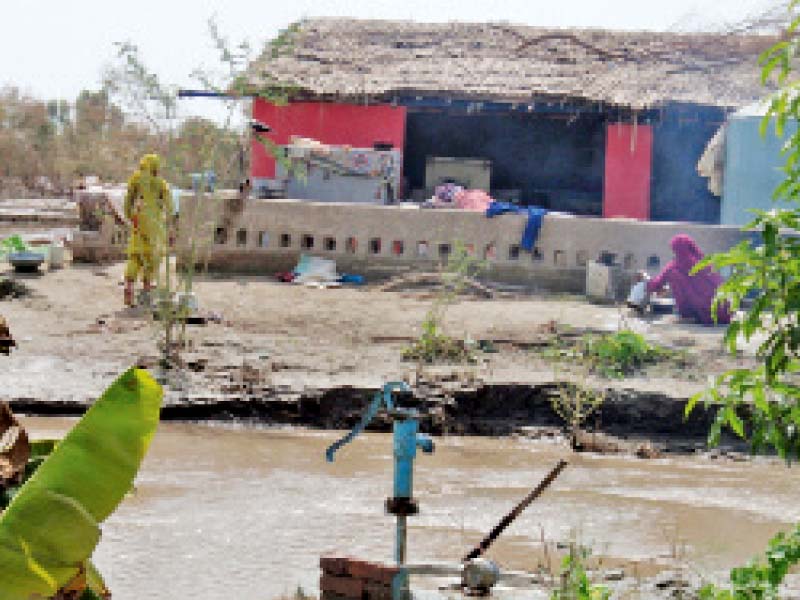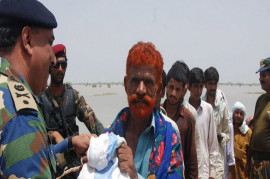
They lead a simple life. Have been living like this for centuries. The katcha (riverbed) has no electricity to power expensive tastes. Neither have these folk ever felt the need for it. It is an unspoiled world, miles away from the hustle and bustle of the urban centres.
Life in the katcha begins every day at dawn, when the residents make their way to the fields.
The katcha area is spread over 700 kilometers between Guddu Barrage and Thatta. The land legally belongs to the irrigation department, but the revenue department has allotted a lot of it for agriculture purposes. The residents of these areas are mostly employed as peasants by influential persons, who either possess the land by virtue of allotment or through forceful occupation. Some of these influential persons have even occupied land in the middle of the river, near Sukkur barrage and the Lense-Down Bridge.
The lands mostly belong to the influential families of the area, including the Solangi, Mazari, Kosh, Khoso, Jatoi, Mahar, Chachar, Leghari, Bozdar, Jagirani, Marfani and others. Some of these influential persons have constructed 'zamindari bunds' in the middle of the river to safeguard their crops in case of flooding. These bunds, in the event of high floods, prove troublesome for the irrigation department, because the entire pressure is then put on the protective bunds. Though the government claims to have demolished all the zamindari bunds in the Indus, some of them still exist today.

During a survey of the katcha, it was observed that most of the residents work as peasants for influential landlords, chieftains, MNAS, MPAS and police officers. The former not only work on the lands, but also look after their livestock.
Earlier, some criminals had occupied lands in the katcha of some districts of Upper Sindh, including Kashmore-Kandhkot, Jacobabad, Shikarpur, Sukkur, Ghotki and Khairpur. Most of them have either been killed by the police or have moved to the 'pacca' areas. However, the most notorious dacoit of Southern Punjab, Chotu Bakhrani, and Sulto Shar of Sindh jointly occupy over 1,400 acres of land in the katcha at the bordering areas of Sindh and Punjab. Recent joint operations against them proved quite futile, except that the police allegedly managed to take away wheat worth millions of rupees.
An island of cultivation
A huge island has been formed near the Sukkur barrage due to the permanent closure of 10 of its gates. This island has been forcefully occupied by a serving senior police official, where his men are seen working and growing vegetables, which are later sold in the local market. Another island near the Lense-Down Bridge near Rohri is also under the occupation of this influential police officer, where his men grow vegetables too. The irrigation officers, who are supposed to take action against the occupation of the islands, seem to be too scared of the police officer and have simply sent a report in this regard to their seniors.
Haji Mohammad Siddiq, Dilbar, Ghulam Ali and Ehsan Ali claim they have been living in the katcha since their forefathers. They work on the lands of influential persons on the basis of shares in the yield. With the land so fertile, they often get a bumper crop of wheat. This is, however, not enough for their yearly stock and they earn their livelihood through the sale of livestock or milk.
For his part, Sukkur Commissioner Mohammad Abbas Baloch said that the residents of the katcha areas were living without any facility from the government and were playing a vital role in boosting the agro-economy. Baloch reminisced the time when former prime minister, Zulfikar Ali Bhutto, had established police stations in the katcha areas. As an incentive for the policemen deployed on duty in the katcha areas, the government had also allotted 65 acres of land attached to every police station. This too did not prove to be enough motivation and the police stations have now been abandoned.
Published in The Express Tribune, August 23rd, 2015.

























1714024018-0/ModiLara-(1)1714024018-0-270x192.webp)









COMMENTS (1)
Comments are moderated and generally will be posted if they are on-topic and not abusive.
For more information, please see our Comments FAQ